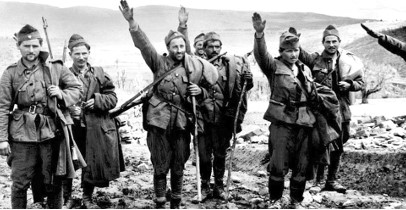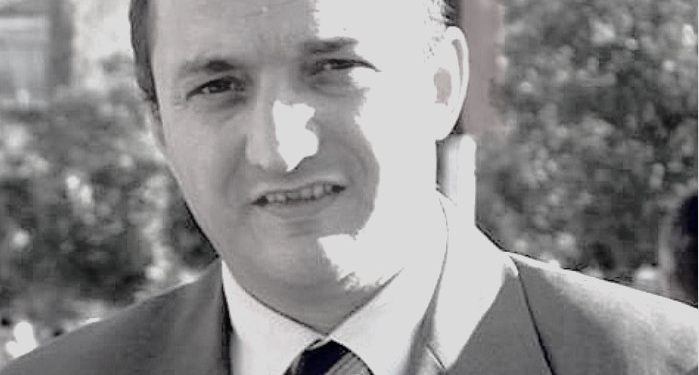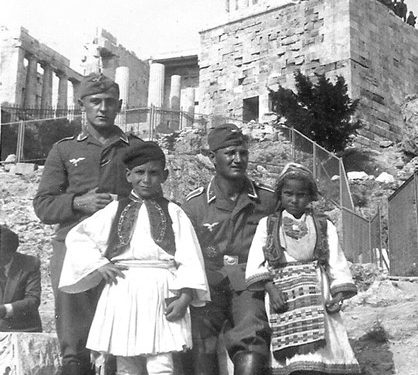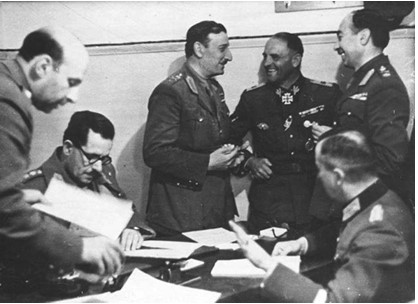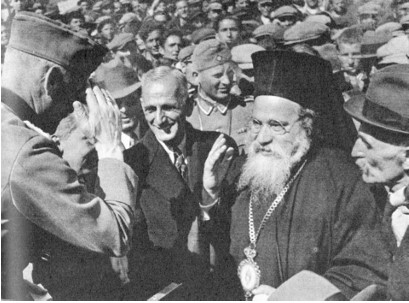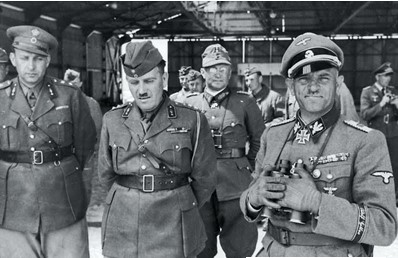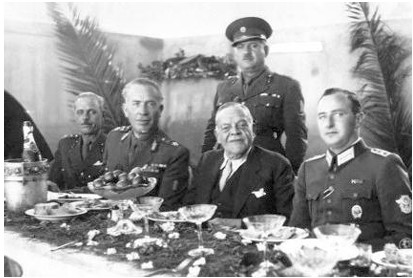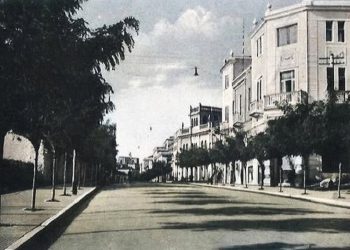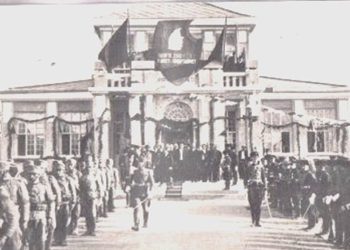By Arben P. Llalla
Part three
ELAS had been dismantled; the left-wing resistance forces were being pursued by government forces, commanded by the Minister of Public Order, Napoleon Zerva.
-The Greek collaborators, designers, and leaders of the genocide in Chameria (1944-1945). The truth about the collaboration of the Cham people with the Germans –
PREFACE
Memorie.al / The period when I started writing the book were from 2008-2016, collecting materials little by little. It was very difficult for me to find original photographs and some Greek newspapers for the years in question. The Greek state and its state structures have been feeding internal and external opinion for about 70 years with books and writings of lies about what actually happened from 1936-1945, regarding the Albanian minority in Chameria-Southern Epirus.
Continued from the previous issue
German troops in May 1941 were honored by Metropolitan Pataron Meletios and the mayor of Alexandroupoli.
After the Greek army of Epirus and Greek Macedonia surrendered, the Greek generals of Vlach origin gained privileges at the ministerial level during the 1941-1944 Governments. On April 29, 1941, the high-ranking German officer Alfred Jodl and the Italian one, Alberto Ferrero, chose Jorgo Tsollakoglou, of Vlach origin, to head the Greek government as prime minister. After Jorgo Tsollakoglou was chosen as prime minister, he appointed General Panagiot Dhemestihas, who was a Vlach, as Minister of Interior. The other high-ranking officer, Theodhor Sarantin, also a Vlach, was appointed prefect of Trikala.
General Jorgo Tsollakoglou, prime minister from April 30, 1941 – December 2, 1942.
On December 2, 1942, Konstantinos Logothetopoulos was appointed prime minister, and he remained in this post until April 7, 1943, when he was dismissed for incompetence. In April 1943, Ioannis Rallis was elected Prime Minister of Greece, and he founded the “Security Battalions”. These battalions were founded on the basis of Law 260/1943, (Official Gazette 180 A), issued on June 18, 1943. The members of the “Security Battalions” and the Greek SS troops were people who hated communism, educated in school during the fascist government of Metaxas (1936-1941), with a pro-German Nazi culture.
Prime Minister Ioannis Rallis, for the founding of the “Security Battalions”, found support from the officers of the regime of General Theodoros Pangallos and the republicans of Eleftherios Venizelos. The Security troops often proved to be more brutal than the Germans with their fellow Greeks. There were cases when the Germans would release a person suspected of being a communist, while a few meters further on, this person would be arrested and executed by the “Security Battalions”. This police-military formation banned theatrical performances in some cities, closed cafes, and even went so far as to burn personal libraries in the homes of citizens.
Security Battalions were in Athens, Tripoli, and Ioannina. So, they mainly operated in Central Greece (Agrinio and Nafpaktos), the Peloponnese (Tripoli, Patras, Nafplio, Gythio, Kalamata, Sparta, etc.), as well as Athens, Evia, and occasionally in some regions of Thessaly. The Volunteer Battalions operated in Katerini, Kozani, Giannitsa, Kilkis, Lahanas, and Kria Vrisi. While the Police Battalions operated in Athens, Thessaloniki, Volos, and Gendarmerie Battalions were also founded in Karditsa, Larissa, Lamia, and Evia.
On November 27, 1943, the Security Battalions conducted checks in hospitals to find any communists being treated. They also conducted checks in homes, which led to the looting of citizens. They would hang people in city centers to create fear, and they participated with the Germans in the executions of arrested communists.
The Security Battalions carried out executions in retaliation for the killing of Germans by the resistance forces. On March 15, 1944, in Patras, 200 communists were executed under the supervision of German forces, in the same month 44 others, by order of the Kalamata Security Battalion. The Security Battalions were divided into two categories: a.) 9 battalions, with a total of 5,725 members, which were founded and commanded by Prime Minister Rallis. b.) 22 battalions were structures that operated independently and consisted of 16,625 members.
These were volunteers who were armed to fight against the EAM-ELAS communists, alongside the German army and commanded by Lieutenant-General SS, Walter Schimana. On October 10, 1943, the Greek gendarmerie troops were ordered to join the German SS troops, establishing the Greek SS troops. According to data confirmed by photographs, it is said that in the areas where the majority of the population was Slavic-Macedonian, Pella, Florina, and Kastoria, the Ethnic Security Battalions, which consisted of this ethnicity, operated, and their number was approximately 2,500-3,500.
There are some photographs where the Security Battalions, the SS troops, and the Greek National Army-EES, led by the high-ranking Greek officer, Georgios Pavlos, are seen being joyfully welcomed by the population in Kria Vrisi of Giannitsa, near Thessaloniki. On that day, these troops were also accompanied by the priest Georgi Vallidhis. In the settlements inhabited by the majority of the Vlach population, in the Pindus Mountains, Alcibiades Diamanti was proclaimed Prince of Pindus. Together with Nikolaos Matusi and with the support of the Greek, German, and Italian governments, they founded the Roman Military Legions with the Vlachs of Larissa, which were composed of the Vlachs of Greece.
They claimed that out of the 140,000 Vlachs living in Thessaly, about 25% of them would join their Legions to gain autonomy for the Vlachs of Pindus. According to Greek historians, to realize the project in question, after many efforts, they were able to have about 2,000 soldiers of Vlach ethnicity, who were placed in two bases: Larissa and Elassona. Nikolaos Matusi, a Vlach from Samarina, was elected Prime Minister of the Principality of Pindus and Commander of the Vlach troops. The military uniform of the soldiers of the Legions was the same as that of the Italians.
The Vlach military troops operated jointly with the Italian army in Epirus and Greek Macedonia, such as: Trikala, Elassona, Samarina, Grevena, Metsovo, Kalabaka, Larissa, Farsala. They terrorized the population, stealing their food and property. The Vlach Roman Legions were attacked several times by the Greek partisan troops of ELAS.
In Greek books and newspapers after the Greek genocide against the Albanian population in Chameria in June 1944 by the right-wing EDES forces, commanded by Zerva, it is said that the Albanian National Council of Chameria-KSILIA, which consisted of 2,500-3,200 members, operated in Chameria. This data that there were about 3,000 Albanians with a regular military formation was never confirmed.
There is no document showing that “Security Battalions” and Greek SS troops were founded, and that their members could have been Albanians from Chameria. “Security Battalions” did not exist in Chameria, because the local population was aligned with the partisan resistance forces, also due to the fact that in Albania, the broad masses were aligned with the Albanian National Liberation Army.
The Chameria Provincial Council, led by Nuri Dino and Mazar Dino, operated under the supervision of the fascist occupation authorities; it was not officially recognized by them. This undefined position allowed for opportunities for maneuvering, which the “Provincial Council” also used in its own attempts to establish connections with the Allied Headquarters in the Mediterranean. Vasil Krapsiti in the book “The Muslim Chams of Thesprotia” writes: “Mazar Dino was an agent of Italy, but also of Turkey. He created a wide espionage network in Thesprotia, with his frequent visits, – almost every year, – to its country (Thesprotia), he maintained close ties of the high-level network, acting according to his anti-Greek declarations. With the beginning of the Italian occupation, (May 1941), he was legally established in Paramythia, as the supreme political leader of the Muslim Chams. He was the main cause of all the wickedness against the Greek Christian population of Thesprotia, during the period 1941-1944.” So, we are dealing with Albanians who were in the service of other countries and not Albania, this excludes the staining of Albanians for the actions of Mazar Dino to the detriment of Greece and the Greeks, because the damage he has done to them, they may have done as much damage to Albania and the Albanians.
In the Greek, British, Italian, and German archives, no photograph or report from the years 1941-1944 has been found, showing Albanians from Chameria in the uniform of the “Security Battalions”, with clothes showing SS signs, or Italian uniforms. The statements of EDES that Albanians in Chameria were aligned with the SS troops were made after 1945, after the Albanians had been expelled from Chameria and ELAS had been dismantled, the left-wing resistance forces were being pursued by government forces, commanded by the Minister of Public Order, Napoleon Zerva.
The claims of EDES were made when the issue of Cham refugees who came to Albania was being discussed in International Organizations, as a violation of human rights and genocide. All those photos published after 1990, which Greek historians and researchers present to us as Albanians from Chameria in German and Italian clothes, are photomontages.
It is a pity and disgusting when you read that Greek historians, journalists, and researchers make ordinary photomontages or misinterpretations, to weave a lie about something that never existed. During the 1941-1944 war, the majority of Albanians in Chameria were aligned with the EAM-ELAS resistance forces. These forces in Thesprotia clashed with arms several times with the EDES forces, which Napolon Zerva commanded.
According to the data, there were about 1,000 boys from Chameria, members of the Albanian and Greek resistance army. In the ranks of ELAS, 68 Cham partisans gave their lives. The leader of ELAS, Athanas Klara, known as Aris Veluhiotis (1905-1945), in October 1943, gave the order for the arrest of the leaders and the dismantling of EDES in Thesprotia. Santos claimed that the campaign to cleanse EDES was about the rapid liberation of Epirus.
On June 16, 1945, Aris Veluhiotis together with Xhavella, real name Janis Angjelos, committed suicide to avoid falling into the hands of the EDES troops, who later desecrated their bodies and cut off their heads, parading them first in Trikala. These kinds of macabre massacres were carried out only by the EDES formations commanded by Napoleon Zerva, who was the minister of public order that year. After Zerva identified the heads of Veluhiotis and Xhavella, he took them with him to display them in one of the squares of Athens.
The irony of the fate of the two high-ranking ELAS leaders is that they liberated the city of Trikala, and in this city, their heads would be placed in the main square to be shown to the people. Thus, the head of the Greek anti-fascist resistance army ELAS, Athanas Klara, known as Aris Veluhiotis (1905-1945), was massacred by the EDES forces, which in June 1944 had massacred the defenseless Albanian population in Chameria.
After the end of the war in Greece, most of the Security Battalions and SS troops were not punished; they were aligned with the EDES army (Δζληθός Γεκοθραηηθός Διιεληθός ύλδεζκος) Greek National Republican League, which was led by Zerva against the EAM-ELAS resistance forces.
At the end of the German occupation of Greece, in September-October 1944, about 8,000 people from the Security Battalions were armed and ready to fight against the EAM-ELAS communists. In this line of action, the war against the Greek communists during the German withdrawal included Greeks and Germans, and finally also the British military liaison missions (ML), known for an uncompromising anti-communist policy in Greece.
In June 1945, the “Lefkis Vivlos” of EAM gives the names of 59 former Security officers. Two months later, 117 former members of the Security Battalions were registered at the military school for a career. The following year the foreign office admitted that 228 were already officers in the Greek army.
In 1946-1949, Greece was plunged into a civil war between the right-wing government forces and the left-wing forces of the Greek Democratic Army-DSE, which was led by Markos Vafiadis.
As is known, this war ended with the victory of the right-wing government forces, helped by the US and Great Britain armies. The civil war of 1946-1949 also caused the cleansing of Northern Greece of the Slavic-Macedonian element, who was supporters of the National Democratic Army. After the end of the Second World War, the extreme right-wing Greek formations took advantage of the situation by cleansing Greece of Greek citizens of non-Greek nationality.
March 25, 1944, a day of shame for Greece
Early in the morning of March 25, 1944, with a planned operation and with the help of the Greek gendarmerie, the Gestapo “cleaned” the Jewish neighborhoods of Ioannina. They gathered 1,725 men, women, and children in trucks. They were the Jews of Ioannina who had lived and worked for centuries in this city together with Greeks, Albanians, Vlachs, Roma, etc. Only three hours were given to the Jews to take with them about 50 kg of things per family.
At 10:00 a.m., the Jews were put on 80 trucks and sent to Trikala. The operation was considered successful as 95% of the arrested Jews were displaced. The Greek population, which was aware of the operation, standing on the streets of the city, followed the displacement of the Jews with silent satisfaction. During the operation on March 25, 1944, to deport the Jews of Ioannina to the extermination camps in Austria and Germany, many Albanians from Chameria were also arrested that day, and they were also sent to these camps together with their Jewish fellow citizens.
Nuri Emin Zane from Filat was in Ioannina on March 25, 1944, for his daily work and was arrested by the Germans and Greek gendarmes to be deported with the Jews. Nuri Zane was first sent to the Mat’hausen camp in Austria and then to Dachau in Germany. Other Albanians from Chameria, who were sent to these camps with the Jews, were Hajri Fetau, Osman Zenel Taka, Mezan Jonuzi, etc.
After the surrender of Nazi Germany and their liberation from the camps, the Chams who had been interned would face an even greater tragedy, that of the massacre of their family members by the EDES army led by Napoleon Zerva and the Metropolitan of Paramythia, Dorotheos.
The collaborating prime ministers
Giorgio Tsollakoglou was the prime minister who collaborated closely with the Germans from April 1941 to December 1942. He is one of the generals of the Greek army, who, together with the Metropolitan of Ioannina, surrendered the Greek divisions to the Germans unconditionally. After the liberation, he was sentenced to death and then to life imprisonment. He died in May 1948, sick with leukemia. The Athens Municipality took over his funeral, and he was buried with honors.
Konstantinos Logothetopoulos was the prime minister of Greece who collaborated with the Germans from December 1942 to April 1943. He was pro-German and did not see the occupation of Greece by Germany as an occupation, but as a collaboration and success between the two countries. He was sentenced to life imprisonment in 1945 and was pardoned in 1951. He died in 1961.
Ioannis Rallis was the prime minister of Greece from April 1943 to October 1944. He served the German occupiers with zeal and founded the special security troops, which were parallel to the German SS troops. He was arrested after the German surrender and was tried for high treason in February 1945 and died on October 26, 1946, in prison from pneumonia. The family was not expelled from Greece because they had collaborated with the Germans. His son, Giorgio Ralli, became a politician and deputy in the early 1950s. He was the prime minister of Greece from 1980-1981. / Memorie.al
To be continued in the next issue




